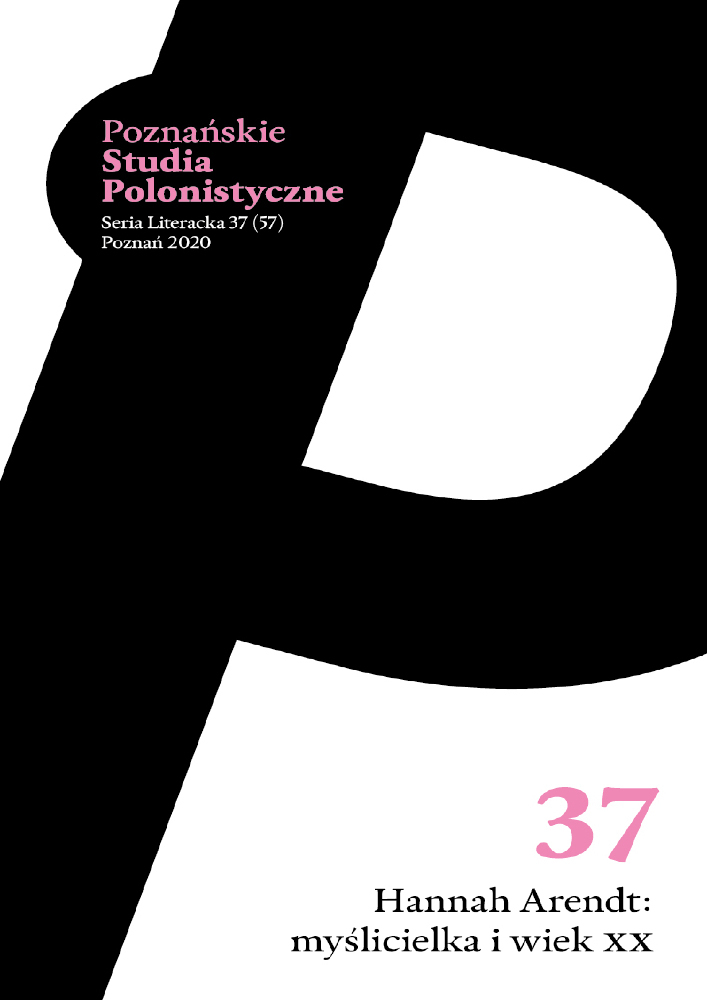Abstract
The problem of responsibility became, particularly in the second half of the twentieth century, one of the most important subjects of philosophical reflection. Many thinkers, including Martin Heidegger, Emmanuel Lévinas, Karl Jaspers and Hans Jonas, expressed their views about it. The evil of totalitarian systems became the main experience triggering discussion about responsibility. The reflection included in Hannah Arendt’s works is an important voice in the debate and it remains up-to-date despite the passage of time. Arendt demonstrated the multidimensional and dramatic character of responsibility by presenting the meanings of vita contemplativa and vita activa in reference to every person’s existence. The thinker was searching for the answer to the question about the essence of responsibility. Today, she still introduces the readers of her works and the listeners of numerous interviews she gave to a more profound understanding of responsibility-related experiences. In my humble opinion, the greatest value of philosophical interpretation of Hannah Arendt’s works is the fact that they still remain constructive reflections. Their influence is not limited to shaping one’s mind only. It goes deeper and develops our attitudes, including the attitude to properly understood responsibility.
References
Améry Jean (2007), Poza winą i karą, przeł. Ryszard Turczyn, posłowiem opatrzył Piotr Weiser, Homini, Kraków.
Arendt Hannah (1974), Osiemdziesięcioletni Heidegger, przeł. Henryk Krzeczkowski, „Znak”, nr 240, s. 691-701.
Arendt Hannah (2006), Odpowiedzialność i władza sądzenia, red. i wprowadzenie Jerome Kohn, przeł. Wojciech Madej, Mieczysław Godyń, posłowiem opatrzył Piotr Nowak, Prószyński i S-ka, Warszawa.
Arendt Hannah (2010), Kondycja ludzka, przeł. Anna Łagodzka, wstępem opatrzyła Margaret Canovan, Aletheia, Warszawa.
Arendt Hannah (2016), Życie umysłu, przeł. Hanna Buczyńska-Garewicz, Robert Piłat, Bogdan Baran, Aletheia, Warszawa.
Burdon Peter (2017), Hannah Arendt: Legal Theory and the Eichmann Trial, Routledge, London.
Descartes René (1988), Rozprawa o metodzie, przeł. Wanda Wojciechowska, PWN, Warszawa.
Ettinger Elżbieta (1998), Hannah Arendt – Martin Heidegger, przeł. Elżbieta Wolicka, Znak, Kraków.
Heidegger Martin (1994), Bycie i czas, przeł., przedmową i przypisami opatrzył Bogdan Baran, PWN, Warszawa.
Heidegger Martin (2000), Co zwie się myśleniem?, przeł. Janusz Mizera, PWN, Warszawa–Wrocław.
Heidegger Martin (2002), Technika i zwrot, przeł. Janusz Mizera, Baran i Suszczyński, Kraków.
Heuer Wolfgang (1987), Hannah Arendt mit Selbstzeugnissen und Bilddokumenten, Rowohlt Taschenbuch Verlag, Hamburg.
Hey Dominik (2017), Der Eichmann-Prozess. Der Begriff des Handelns und seine Konsequenzen nach Hannah Arendt, Grin Publishing, München.
Höhne Heinz (1990), Der Orden unter dem Totenkopf. Die Geschichte der SS, Gondrom Verlag, Bindlach.
Husserl Edmund (1975), Idee czystej fenomonologii i fenomenologicznej filozofii. Księga pierwsza, przeł. i przypisami opatrzyła Danuta
Gierulanka, tłumaczenie przejrzał i wstępem poprzedził Roman Ingarden, PWN, Warszawa.
Platon (1999), Państwo, przeł. Władysław Witwicki, Alfa, Warszawa.
Safranski Rüdiger (2008), Ein Meister aus Deutschland. Heidegger und seine Zeit, Carl Hanser Verlag, München.
Wachsmann Nikolaus (2016), Historia nazistowskich obozów koncentracyjnych, przeł. Maciej Antosiewicz, Świat Książki, Warszawa.
License
Authors
Authors of texts accepted for publication in „Poznańskie Studia Polonistyczne. Seria Literacka” are required to complete, sign and return to the editor's office the Agreement for granting a royalty-free license to works with a commitment to grant a CC sub-license.
Under the agreement, the authors of texts published in „Poznańskie Studia Polonistyczne. Seria Literacka” grant the Adam Mickiewicz University in Poznań a non-exclusive, royalty-free license and authorize the use of Attribution-NoDerivatives 4.0 International (CC BY-ND 4.0)Creative Commons sub-license.
The authors retain the right to continue the free disposal of the work.
Users
Interested Internet users are entitled to use works published in „Poznańskie Studia Polonistyczne. Seria Literacka” since 2016, for non-commercial purposes only, under the following conditions:
- attribution - obligation to provide, together with the distributed work, information about the authorship, title, source (link to the original work, DOI) and the license itself.
- no derivatives - the work must be preserved in its original form, without the author's consent it is not possible to distribute the modified work, such as translations, publications, etc.
Copyrights are reserved for all texts published before 2016.
Miscellaneous
Adam Mickiewicz University in Poznań retains the right to magazines as a whole (layout, graphic form, title, cover design, logo etc.).
